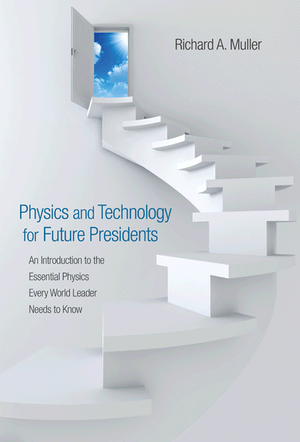PHYS 150 :: Physics Illinois :: University of Illinois at Urbana-Champaign
Course Description
Physics for Future Leaders
U of I students go on to become leaders in many fields of endeavor: business, science and technology, law and politics, education, the arts, and more. This course is inspired by a simple question:
What should you, a future leader, know about physics?
This course is intended to teach you how the basic workings of our universe shape our daily lives and frames some of the most important issues of our time. We will discuss the science behind these issues, with the goal of becoming better informed decision-makers. While we will discuss will be highly relevant to public policy, this is a science course: we will focus on the physics behind these topics and leave the decisions to you. I also hope to pass along some of the beauty of physics: how a few basic principles interlock together to give us the complex world around us.
Topical outline
We will cover roughly one topic (book chapter) per week. The topics are divided into three broad units, each building up to a capstone issue that I hope will spur discussion. Your questions are welcome, and will inform what we discuss!
- Energy, Power, and Explosions
- Atoms and Heat
- Gravity, Force, and Space
- Nuclei and Radioactivity
- Nuclear Reactors and Weapons
- Electricity and Magnetism
- Waves
- Light
- Invisible Light
- Climate Change
- Alternative Energy
- Quantum Physics and Modern Technology
- Relativity, Space, and Time
- The Universe
Course Staff
Course Instructor
Professor Jeff Filippini
Departments of Physics and Astronomy
E-mail: jpf
Office: 405 Loomis Lab
Office Hours: Monday 4 pm (or by appointment), 405 Loomis Lab
Research interests: experimental astrophysics and cosmology
Teaching Assistant
Allycia Gariepy
Email: gariepy2
Office: 241 Loomis Lab
Office Hours: Monday 3 pm
Research interests: theoretical astrophysics
Course Components
Lectures
Tuesday / Thursday 9:30 - 10:50 am in 151 Loomis Lab
Lecture participation, via i>clicker questions and classroom discussion, is a key component of this course. If you don't come to lecture, you won't do well in this course.
Text
|
Richard Muller, Physics and Technology For Future Presidents This book is available in the campus bookstore and on reserve in Grainger Engineering Library. Published in 2010, so used copies are fine. (Be warned that the same author also has two similarly-named popular audience books: Physics for Future Presidents and the more targeted Energy for Future Presidents.) |

|
|
Some additional readings from: David JC McKay, Sustainable Energy - Without the Hot Air This book is available for free online, though paper copies are also available. |

|
I will also link to additional readings on occasion as appropriate (all free!).
Assignments
Assignments and quizzes are a crucial component of learning. We will have several types of assignment in this course:
- i>clicker questions: Each lecture will feature in-class i>clicker questions, answered in collaboration with your classmates.
- Homework: Weekly homework assignments for this course will be completed online through ByteShelf. These come in two types: Checkpoint (typically written answer) and Homework (typically multiple-choice).
- Quizzes: Short quizzes covering the reading for the current week will be given in class.
- Exams: We will have two midterm exams (in class) and one final exam (end of term).
Important Information
University Requirements
This course satisifies the general education requirement for Physical Sciences. It also satisfies the Quantitative Reasoning II requirement.
Academic Integrity
All activities in this course are subject to the Academic Integrity rules as described in Article 1, Part 4, Academic Integrity, of the Student Code. Infractions include, but are not limited to:
- cheating
- plagiarism
- fabrication
- academic interference
- computer-related infractions
- unauthorized use of university resources
- sale of class materials or notes
- facilitating infractions of academic integrity.
Violations of any of these rules will be prosecuted and reported to the student's home college. All aspects of the course are covered by these rules, including:
- quizzes
- homework
- i>clickers
- exams
- documentation submitted for petition for an excused absence
Safety resources
Emergencies can happen anywhere and at any time. The campus police have thus asked the faculty to share this handout on emergency preparedness, which I encourage you to read through.
